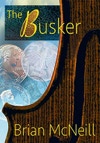
The
Busker
Book 1 of the Busker Series
Alex Fraser is a rootless drifter who lives by playing Scotland’s traditional music on the street. He makes his home wherever his fiddle might earn him a few coins. He’s a man hiding from life, haunted by the death of his wife, which he caused. After serving his sentence in Scotland, he decides to try his luck in Europe.
In Switzerland he befriends another busker—Max, an old accordionist. Max tells him a story, a puzzle rooted in the Spanish Civil War. It’s a tale of kindness and brutality, involving a German intelligence unit, a rescued child, a painting and a huge inheritance. Max, dying, charges Alex with solving the puzzle.
The maelstrom of violence and greed he uncovers is byzantine, daunting and ruthless. It pursues him across a continent, makes him confront love again, and ultimately forces him to believe in his own worth as a human being.
....Half past six in the evening at Central Station was a ballet school gone wild. Glaswegians walked, ran, leapt and staggered past each other, punctilious in their avoidance of bodily contact, for in this town you could never tell what an accidental shunt might bring in its wake. Politeness and aggression were both recognised norms, and respect for the city's volatility had made Glasgow a breeding ground for generations of dancers. Even those who were merely waiting jigged about a little, warming up for their performance, one eye on the knots of silent policemen who were spread around the place, the other on the board above them.
Only the old woman was absolutely still, as she'd been when I passed her on my way to the phone; still and silent, a disconnected counterpoint to the mad minuet which surrounded her.
She stared at the five-sided glass cubicle from the tunnel of her head-scarf, her eyes tiny pinpoints of light, all but invisible beneath lids that were swollen red pelmets. It was a structure which stood out from the rest of the station fittings, a futuristic litter bin which people threw their beer cans at instead of into. A scrum of them garnished it now, as though the thing had its own gravitational pull. Occasionally one of the passers-by would stare at the old woman in her turn - in appreciation, for Glaswegians have a ready eye for paradox. Her brown wreck of a coat might have been fashionable in the forties, the blue ankle-socks and cracked polythene children's sandals in the sixties, but it was the plastic shopping bag which caught the attention. Her worldly goods poked through the surface, but the yellow-on-purple legend was still readable: What Every Woman Wants.... The bag stirred in the feeble wind, slapped against a bare, blue-veined leg. The sign on the cubicle which held her eyes said Meeting Point in red and white. She stood rock-still, a parable caught between two ironies.
I watched her as I waited for my train to come up on the board. The newness of the clothes was enough of an irritant to make me fidget. Unconsciously, I joined the station's restless dance, moving about, tapping my feet. I was impatient to be away from here, to take the next steps towards solving the puzzle surrounding myself and the child. Around me the conversations drifted, the chorus of the Greek play Glasgow likes to make of its Saturday night; a continuous performance that oscillates between comedy and tragedy, a drama which depends on reaction to drunken boredom for its theatrical staple, a spectacle dangerously careless of the distinction between actor and audience.